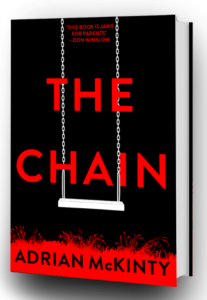Is The Chain worth all the hype?
 A surge of excitement has been springing from literary circles in the build-up to this summer’s release of Adrian McKinty’s The Chain.
A surge of excitement has been springing from literary circles in the build-up to this summer’s release of Adrian McKinty’s The Chain.
Heavyweight authors such as Stephen King, Don Winslow and Dennis Lehane, together with a deluge of publishing insiders, critics and bloggers, have been waxing lyrical about the novel over the last few months having received their advanced reader copies – so many in fact that I was getting worried for McKinty that there wouldn’t be many readers left to actually buy the book following its release.
Fear not, for the buzz hasn’t stopped since its publication a couple of weeks ago and my purchase is another contribution to the royalty coffers. Readers of this site will know that I am a huge fan of McKinty, loving the rawness and nostalgia that comes from his Sean Duffy series and the brutal noir of his Michael Forsythe trilogy.
The Chain is a departure from his previous work, written more in the style of a commercial thriller to capture a wider scope of readers. The premise in a nutshell: Your phone rings. A stranger has kidnapped your child. To free them you must abduct someone else’s child. Your child will be released when your victim’s parents kidnap another child. If any of these things don’t happen, your child will be killed. You are now part of the chain.
A chilling start, and the best thing about the first half of The Chain is how McKinty’s trademark pace and tempo drives the story along. Rachel O’Neill, a mid-30s divorcee who is recovering from cancer, is the one who gets that dreaded phone call, informing her that her 13-year-old daughter Kylie has been kidnapped. Rachel acquires the support of ex-brother-in-law Pete, an Iraq war vet who has the weaponry and IT software knowledge to help her take on the people behind the chain.
Some reviewers have remarked about McKinty’s shift from crime novel to mainstream thriller here, but I’ve never been a fan of pigeon-holing books into genres that cover such vast material. The crossovers are inevitable. I’ve regarded all McKinty’s novels as ‘thrillers’, in that they are thrilling reads packed with thrilling action, and this work is no different.
It is heavily plot-driven of course, but it doesn’t come at the cost of losing any depth of characterisation. McKinty gives us short bursts of detail that bring the protagonists to life, that sharpen the edges. This is especially the case in the second half of the book that delves into the backstory of how the concept of the chain was formed and the people behind it. Although I won’t give much away for fear of spoilers, it is these darker elements to the story that really give the book that punchy, visceral McKinty feel.
The plot is reliant on several parents from a non-criminal background taking on, in turn, a string of unfamiliar and life-threatening tasks. Scouting and prepping a suitable hideaway, planning and successfully carrying out the ruthless kidnapping of a child, becoming proficient in the use of firearms, hiding evidence of their identities in all communications, covering their tracks physically and digitally, convincingly threatening the next parent in the chain, etc. In the hands of some authors, this might come across as slightly implausible, but McKinty is a safe pair of hands. His years of quality writing experience allow him to paint a vivid picture of what motivates his characters, in this case demonstrating that the besieged parents, suffering from the gut-wrenching pain of having their child taken from them, are driven by that very despair – and the guilt they will have to live with if they don’t pull this off – to stoop to whatever level is necessary to get their child back. A primeval force takes over.
As Rachel herself surmises: ‘Even an imbecile knows you don’t get between a grizzly-bear mama and her cub’
The Chain is a breath-taking read worthy of the hype surrounding it and no writer deserves the success more than McKinty (Paramount have already bought the film rights in a seven-figure deal). In recent interviews McKinty has revealed that – despite the critical acclaim and awards that his backlist has received – he was on the verge of quitting writing due to a lack of monetary return. This came as a surprise to me as I was under the impression that his standing as one of the top British crime writers meant he was doing pretty well earnings wise.
It says a lot about the state of the current publishing industry that such a talented and relatively high-profile author, whose books received coverage in the national press, was struggling to earn a living from the trade. No wonder he wanted to go down the route of producing a more commercially-orientated standalone – and thankfully it’s a belter.
